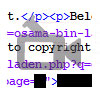 Online scammers are recycling video and images released in the wake of the U.S. special forces raid on Osama bin Laden’s Pakistani compound to fuel Web based attacks that have been linked to rogue anti virus installations and botnets, according to Kaspersky Lab.
Online scammers are recycling video and images released in the wake of the U.S. special forces raid on Osama bin Laden’s Pakistani compound to fuel Web based attacks that have been linked to rogue anti virus installations and botnets, according to Kaspersky Lab.
Screenshot stills taken from home videos taken of the Al Qaeda leader at his Abbottabad, Pakistan compound, that were released by the U.S. government turned up in Web based attacks that used search engine optimized (SEO) links to images hosted on attack Web sites that are exploiting known vulnerabilities, including the Windows Help Center URL validation vulnerability. Similar attacks were seen in campaigns linked to the recent Royal Wedding of England’s Prince William to Catherine Middleton in April, according to a post on Securelist, the Kaspersky Lab Research blog.
The attacks, which play on intense public interest in the successful raid on the bin Laden compound, has been linked to installations of the XP Anti Virus 2011, according to Kaspersky researcher Dmitry Bestuzhev. Attacks using images from the seized videos have also been used as bait to trick users into installing a downloader program dubbed CodecPack that has been linked to the Artro botnet, which is used to push malicious adware, Kaspersky found.
Images and information relating to bin Laden’s capture have been linked to malware campaigns and online attacks since the news broke on May 1. Researchers at Kaspersky and elsewhere have documented spam e-mail and search optimized Web pages offering news of the Al Qaeda chief’s demise. Scam Web links and advertisements have also been spotted on Facebook, Twitter and other social networks.









